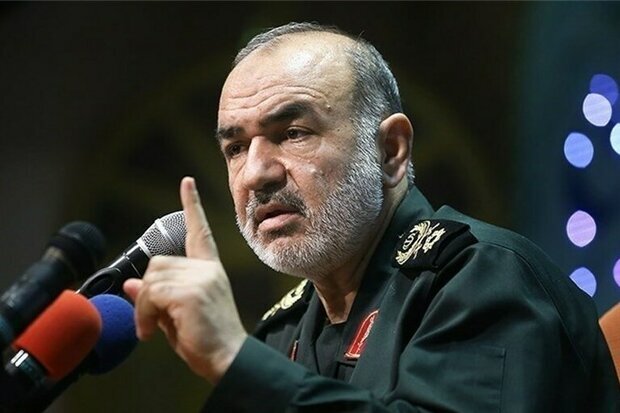Iran’s power of resistance is unlimited, says IRGC chief

TEHRAN – Chief of the Islamic Revolution Guards Corps (IRGC) has said the enemy’s power to pressure Iran is limited but “our power of resistance is unlimited.”
“The enemy has reached saturation in its threats and has no more power, but our power of resistance has just begun and is infinite,” Major General Hossein Salami said on Saturday.
Salami also said the West has never seen the emergence of leaders who cared about human well-being and strived to save humanity from oppression and injustice.
“Oppression has been their political philosophy,” the general stated.
“However, our moves are led by a deep political philosophy and our military action is impacted and led by a divine and spiritual philosophy,” Salami remarked.
He then pointed to the U.S. sanctions on Iran, saying the U.S. is unwilling to lift the sanctions while Europe is unable to do so, emphasizing the need to further rely on domestic capabilities.
U.S. President Donald Trump withdrew the U.S. from the UN-endorsed JCPOA in May 2018 and imposed the “toughest ever sanctions” on Iran in line with his administration’s “maximum pressure” policy against Tehran.
Under the nuclear agreement reached between Iran and six world powers in July 2015, Tehran undertook to put limits on its nuclear program in exchange for the removal of economic and financial sanctions.
Months after the U.S. pullout, European parties established INSTEX, a European special purpose vehicle for trade with Iran to bypass U.S. sanctions, but the mechanism has fallen short of Iran’s expectations.
Top Iranian political figures have likened INSTEX to an “empty bucket”, a “beautiful car without gasoline” and a “bitter joke”.
On May 8, exactly one year after the U.S. withdrawal, Tehran said its “strategic patience” was over and announced a partial withdrawal from some aspects of the nuclear pact.
The announcement, which was declared by the Supreme National Security Council, stated that the country would no longer adhere to some of the limits on its nuclear activities as long as sanctions are in place.
It also threatened to step up uranium enrichment if an agreement is not made within 60 days to protect it from the sanctions’ effects.
In follow-up to that deadline, on July 7 Iran announced that it has started enriching uranium to a higher purity than the 3.67% as the Europeans missed the 60-day deadline to devise a concrete mechanism to protect the country from the U.S. sanctions.
Iran has also threatened to take a third step, which will further reduce its commitments to the JCPOA.
MH/PA
Leave a Comment